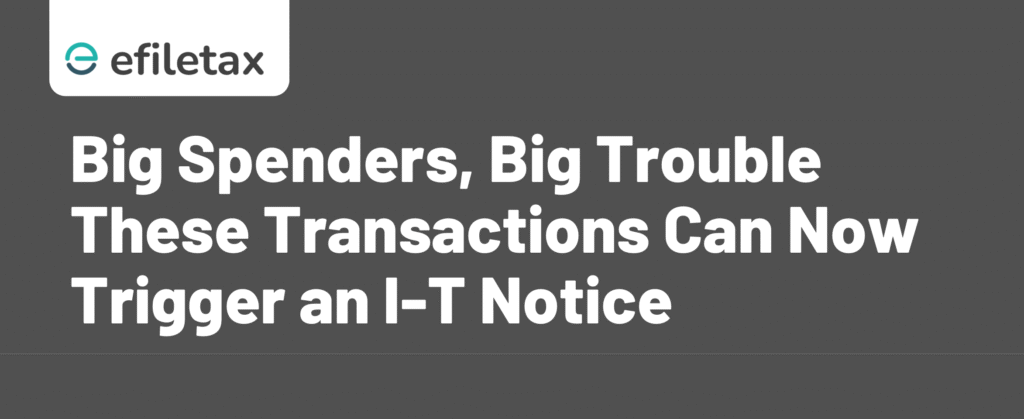
High-Value Transactions Under Income Tax Scanner
The Income Tax Department is tracking high-value transactions more aggressively in FY 2024–25. If you’re spending big on credit cards, buying property, investing heavily in mutual funds, or going on luxury foreign trips — your financial activity could be under the I-T scanner.
Here’s a simplified guide on high-value transactions under income tax that could invite a notice if not reported properly.
What Are High-Value Transactions?
High-value transactions are large financial activities flagged by banks, mutual fund houses, and registrars through Statement of Financial Transactions (SFT) filed with the I-T Department under Section 285BA of the Income-tax Act.
These are auto-reported to the government — and matched against your ITR. Mismatches can lead to scrutiny, notices, or even penalties.
Full List: High-Value Transactions Being Tracked
| Nature of Transaction | Threshold Amount | Who Reports It |
|---|---|---|
| Cash deposit in Savings Account | ₹10 lakh or more in a FY | Banks |
| Cash deposit in Current Account | ₹50 lakh or more in a FY | Banks |
| Credit card payments (cash) | ₹1 lakh or more | Banks / Credit Card issuers |
| Credit card payments (any mode) | ₹10 lakh or more | Banks / Credit Card issuers |
| Purchase of shares | ₹10 lakh or more | Depositories / Brokers |
| Mutual Fund investment | ₹10 lakh or more | Mutual Fund Companies (AMCs) |
| Purchase of bonds/debentures | ₹10 lakh or more | RBI / Issuers / Registrars |
| Purchase of foreign currency | ₹10 lakh or more in a FY | Authorized Dealers / Banks |
| Sale/purchase of immovable property | ₹30 lakh or more | Sub-Registrar |
| Cash payment for property purchase | ₹10 lakh or more | Sub-Registrar |
| Time deposit with banks/NBFCs/Post Office | ₹10 lakh or more | Banks, NBFCs, Post Office |
| Foreign travel expenses (per individual) | ₹2 lakh or more in a FY | Banks / Authorized Dealers |
How Are These Transactions Tracked?
You can check your reported data via:
- AIS (Annual Information Statement)
- Form 26AS (old version with SFT section)
Mismatch between your ITR and AIS may trigger I-T Department queries.
What Should Taxpayers Do?
✔ Check your AIS before filing ITR
✔ Report all incomes linked to high-value transactions
✔ Reconcile credit card spends with declared income
✔ Avoid excessive cash transactions
Legal Angle: Section 285BA & Rule 114E
- Section 285BA of the Income-tax Act mandates SFT reporting
- Rule 114E of Income-tax Rules specifies thresholds and reporting formats
- Non-compliance attracts penalty under Section 271FA: ₹500–₹1,000 per day
Expert View: Don’t Just Earn — Report Wisely
“Many taxpayers assume if TDS is deducted, they’re compliant. But the I-T system now cross-verifies spending patterns. Even salaried individuals with no business income can get notices if lifestyle doesn’t match reported income.” — Efiletax Advisor Desk
One Mistake Could Trigger an ITR Notice
Remember: the government already knows about your big spends. It’s better to declare transparently than deal with a Section 133(6) notice or worse — reassessment under Section 147.
Summary
High-value transactions tracked by the Income Tax Department include cash deposits, credit card spends, mutual fund buys, and foreign travel above specified thresholds. Check AIS and file ITR accordingly to avoid scrutiny.
FAQs
Q1. Do I need to report credit card spending in my ITR?
No, but if your spending exceeds ₹10 lakh, it must match your declared income — else it may invite scrutiny.
Q2. What is the penalty for mismatch in SFT data?
The I-T Department can impose a penalty under Section 271FA, starting at ₹500 per day for delayed or wrong reporting.
Q3. How can I access my AIS data?
Login to www.incometax.gov.in, navigate to ‘AIS’ under the ‘Services’ tab.